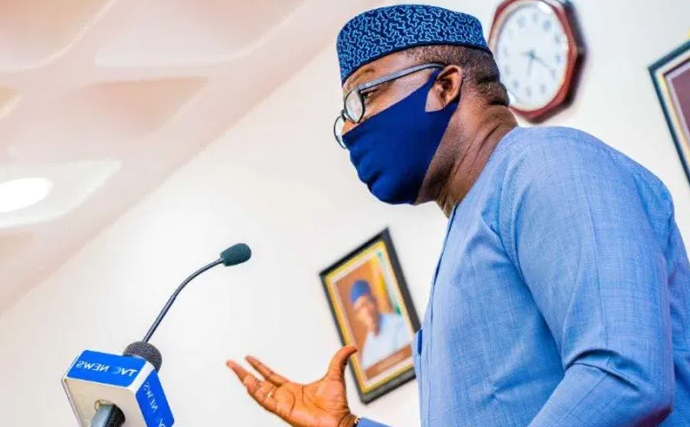Fayemi to Youth: Stop Agonising, Use Your Numerical Strength To Effect Changes

- Cautions clerics against extremism doctrines
Ekiti State Governor, Dr. Kayode Fayemi, has urged the Nigerian youth to quit agonising but take advantage of their numerical strength and voting power to determine who leads at different levels of government in the country.
Speaking in Lagos on Saturday at the 2021 edition of The Platform, an annual event hosted by Pastor Poju Oyemade of the Covenant Christian Centre, Fayemi disclosed that the youth constitute about 70 per cent of the country’s population and, therefore, needed not to agonise but rather organise, join the political process from the ward level up to the national level, and effect the needed change. This, he said was more strategic than seeking a regime change through the back door or giving up in frustration and cursing elected representatives on social media platforms.
The governor stated,
What I am saying in essence is that we have a duty of mentorship to younger people to say to them that sometimes you don’t always get what you push for but that does not necessarily mean that is the end of the road. You keep knocking on the door, banging it and inevitably, it will open. How long it will open for will depend on your capacity to organise.
At the risk of sounding immodest, that’s what got some of us into politics. We believe that another Nigeria is possible; a better Nigeria is possible and we should not stand by the sidelines in pushing for that Nigeria of our dream. We are not there yet but that does not mean we will give up.
Addressing the security situation in the country, the Chairman, of Nigeria Governors Forum (NGF) stressed that everyone was living in fear over the security situation. He said though progress had been made in the country’s counter-insurgency moves, government at the centre could still do much better to secure lives and properties.
His words,
You could argue that we’ve put in a lot of effort in those areas but have they earned the kudos of the citizens as they should? No, they haven’t, because we still have insecurity in the land.
Many may disagree but I will argue that, at least, on insurgency – it may be a distinction without a difference – we’ve witnessed a decline. In relation to the problem of insurgency, which was the most prominent in 2015, when we were coming in. Remember UN House bombing, the churches that were being burnt, Abuja was a no-go area, the North-east but that problem witnessed a decline in the first four years of the Buhari administration.
The Ekiti governor, however, said the insurgency had resurfaced because of the proliferation of arms, as well as the problems of the countries along Nigeria’s borders, noting that the Buhari government and the APC are committed to ensuring the safety of lives and property of Nigerians.
Fayemi said,
Indeed, I’m cautiously optimistic that even though the whole situation looks bleak, there will be light at the end of the dark tunnel. I am confident that sooner than later, the security situation of the country will witness a significant improvement and Nigeria will come out stronger from this moment of national distress.
This optimism is not misplaced. Although the constitution of our country did not give many powers to governors in terms of actual security control of the state, my role as Chairman of Nigeria Governors’ Forum has granted me some insights into the security system of the country and the many underground efforts to tackle the myriads of insecurity issues confronting us as a nation. This moment also calls for sober reflection and system overhaul, going forward.
Fayemi, who had earlier delivered a keynote address at the 2021 Pre-Synod Summit of the Anglican Diocese of Lagos, equally examined the security situation in the country there. He called for the collaboration of the religious bodies as well as a review of the security architecture of the country to wage a total war against insecurity.
Other speakers at the one day summit, themed, “Towards a Safe and Secure Nigeria”, included former Chief Judge and first female Judge of the Federal High Court, Hon Justice Roseline Ukeje; a retired judge of the Federal High Court, Justice Mojisola Olatoregun; and security expert, Dr Ona Ekhomu.
The NGF chairman said,
In fact the creation of Amotekun, Civilian JTF and lately, Ebube Agu can only be a precursor to this. We need a security system that is localised, knowledgeable about the culture and security situation of a particular community. But we need to amend the constitution to empower the various security initiatives to be able to respond to the current challenges.
The mutating security situation in our country requires a concerted effort. This is no time for politics of blame and opportunistic opposition. We need to unite in the face of these evil merchants, who have no respect for children, old age, women, clergy or traditional authorities. They are unsparing and are callous.
In addition, there are two things that we need to address quickly to bring the current wave of insecurity to a halt. We need to have a conversation on how we can recruit a large number of people to join the police and the military even on a short service or otherwise basis.
By available statistics, we need minimum of 200,000 personnel to boost the fighting power of our men. This number is very large and a potential financial and logistic nightmare, yet we cannot delay any further. The ungoverned spaces need to be closed up quickly.
That takes us to the number two issue of financing and arming large recruitment. I believe one of the cheapest and fastest ways to handle those is to amend the law setting up the Nation Youths Service Corps (NYSC) such that we can use the existing orientation camps to train willing and able graduates to reflate the security personnel under a special arrangement that will be worked out. That way, the fund that is currently deployed to the NYSC can be used with just some additional funding, which could be sourced through a national emergency fund for the next five to ten years.
We also need to encourage investment in the real sectors that can engage people and reduce unemployment, which is a major source of insecurity. I urge the Church, the Muslim Ummah and all those who have the means, to set up businesses and industries that support their primary goals. Let us consider joint ventureship in agro-allied industry instead or in addition to building halls, malls and universities.
Today, the greatest challenges facing the country are the youth explosion and the corresponding unemployment challenge. Investment in agriculture is smart for us, as this will guarantee employment and food security. We must also understand that agriculture was the major industry that got us out of the two recessions we had to fall into in recent times.
I invite our religious scholars to re-evaluate our theology education across religion boundaries in line with our national realities. Extremism, which has brought about terrorism, is a product of long coming unrealistic indoctrination of young people into the possibility of a theocratic utopia in a multi-ethnic and multi-religious society like ours.
The programming of the impressionable minds into believing that the hindrance to ‘pure’ practice of their religion is democracy or the presence of other people who must be crushed for the expected utopia to be established, is partly responsible for the chaos that we see today. Our theology must reflect our plural environment. The idea of territorial religious domination, which must expel other tendencies, cannot happen in Nigeria. We should rather teach pluralism and how to remain faithful in the midst of other competing belief systems.

Justin Nwosu is the founder and publisher of Flavision. His core interest is in writing unbiased news about Nigeria in particular and Africa in general. He’s a strong adherent of investigative journalism, with a bent on exposing corruption, abuse of power and societal ills.













